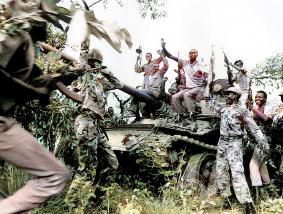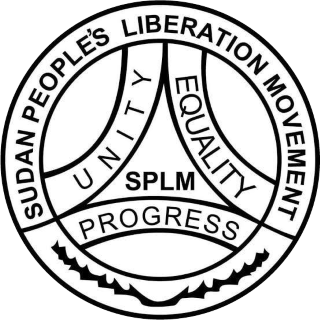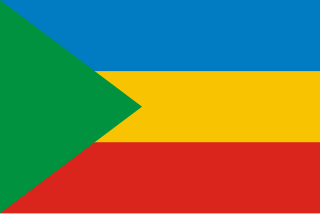
The politics of Eritrea and the government of Eritrea take place in the framework of a single-party presidential republican totalitarian dictatorship. The President officially serves as both head of state and head of government. The People's Front for Democracy and Justice is the only political party legally permitted to exist in Eritrea. The popularly elected National Assembly of 150 seats, formed in 1993 shortly after independence from Ethiopia, elected the current president, Isaias Afwerki. There have been no general elections since its official independence in 1993. A new constitution was drafted in 1993 and ratified in 1997, but has not been implemented. Since the National Assembly last met in January 2002, President Isaias Afwerki has exercised the powers of both the executive and legislative branches of government.

The foreign relations of Eritrea are the policies of the Eritrean government by which it administers its external relations with other nations. Since its independence, Eritrea's foreign relations have been dominated by conflict and confrontation, both in the regional and international arenas. It has maintained often troubled, and usually violent, relations with its neighbors, including brief armed conflicts with Yemen and Djibouti and a destructive war with its bigger-neighbour, Ethiopia. At present, Eritrea has very tense relations with neighboring Ethiopia and Djibouti. Relations in the international arena also have been strained since the last decade, particularly with major powers. What appeared cordial relations with the US in the 1990s turned acrimonious following the border war with Ethiopia, 1998-2000. Although the two nations have a close working relationship regarding the ongoing war on terror, there has been a growing tension in other areas. Ties with international organizations such as the United Nations, the African Union, and the European Union have also been complicated in part because of Eritrea's outrage at their reluctance to force Ethiopia to accept a boundary commission ruling issued in 2002.

Isaias Afwerki is an Eritrean politician and partisan who has been the first and only president of Eritrea since 1993. In addition to being president, Isaias has been the chairman of Eritrea's sole legal political party, the People's Front for Democracy and Justice (PFDJ).

The Second Sudanese Civil War was a conflict from 1983 to 2005 between the central Sudanese government and the Sudan People's Liberation Army. It was largely a continuation of the First Sudanese Civil War of 1955 to 1972. Although it originated in southern Sudan, the civil war spread to the Nuba mountains and the Blue Nile. It lasted for almost 22 years and is one of the longest civil wars on record. The war resulted in the independence of South Sudan 6 years after the war ended.

The Sudan People's Liberation Movement is a political party in South Sudan. It was initially founded as the political wing of the Sudan People's Liberation Army in 1983. On January 9, 2005 the SPLA, the SPLM and the Government of Sudan signed the Comprehensive Peace Agreement, ending the civil war. SPLM then obtained representation in the Government of Sudan, and was the main constituent of the Government of the then semi-autonomous Southern Sudan. When South Sudan became a sovereign state on 9 July 2011, SPLM became the ruling party of the new republic. SPLM branches in Sudan separated themselves from SPLM, forming the Sudan People's Liberation Movement–North. Further factionalism appeared as a result of the 2013–2014 South Sudanese Civil War, with President Salva Kiir leading the SPLM-Juba and former Vice President Riek Machar leading the Sudan People's Liberation Movement-in-Opposition.

The Eritrean War of Independence was a war for independence which Eritrean independence fighters waged against successive Ethiopian governments from 1 September 1961 to 24 May 1991.
The Eritrean Army is the main branch of the Eritrean Defence Forces and is one of the largest armies in Africa. The main role of the army in Eritrea is defense from external aggressors, border security, and developing national cohesion. Historically, the predecessor of the Eritrean Army, the Eritrean People's Liberation Front (EPLF), played a major role in establishing and defending the country's independence from Ethiopia in 1991 during the Eritrean War of Independence. Since then, the army has continued to be involved in low-level border conflicts with Ethiopia and several other neighbors, including Djibouti and Yemen, with the most notable one being the Ethiopian-Eritrean War from 1998 until 2000, which ended in a partial Ethiopian military victory and Eritrean boundary line victory. It is widely regarded as one of the largest and more capable armies in Africa, despite the country having a smaller population than most of its neighbors with around 250,000 to 300,000 personnel due to mandatory national service. Conscription became open ended since the war with Ethiopia and no demobilization has taken place.

The Sudan People's Liberation Movement–North, or SPLM–N, is a political party and militant organisation in the Republic of the Sudan, based in the states of Blue Nile and South Kordofan. The group's armed forces are formally known as the Sudan People's Liberation Army–North or SPLA–N. As of 2017, its two factions, SPLM-N (Agar) and SPLM-N (al-Hilu) were engaged in fighting each other and against the government of Sudan, and as of 2023, the al-Hilu faction is fighting the Sudanese Armed Forces (SAF), while the leader of the Agar faction was appointed into the military-run government.

Eritrea–Israel relations are foreign relations between Eritrea and Israel. Both countries established diplomatic relation in 1993 following Eritrean independence. Eritrea has an embassy in Ramat Gan and Israel had an embassy in Asmara, that was closed in 2022. Their ties were considered as very close, but after 2020 the relations worsened. Both Eritrea and Israel have shared access to the Red Sea.

The South Sudanese Civil War was a multi-sided civil war in South Sudan between forces of the government and opposition forces. In December 2013, President Salva Kiir accused his former deputy Riek Machar and 10 others of attempting a coup d'état. Machar denied trying to start a coup and fled to lead the Sudan People's Liberation Movement-in-Opposition (SPLM-IO). Fighting broke out between the Sudan People's Liberation Movement (SPLM) and SPLM-IO, igniting the civil war. Ugandan troops were deployed to fight alongside the South Sudanese government. The United Nations has peacekeepers in the country as part of the United Nations Mission in South Sudan (UNMISS).

The Second Afar insurgency was an insurgency in the Afar Region of Ethiopia and the Southern Red Sea Region of Eritrea, waged by various Afar rebel groups. Both Ethiopia and Eritrea supported different rebel groups in the region in a proxy war, and occasionally engaged in border skirmishes with each other, as well as with opposing rebel groups.

Eritrea–Sudan relations have historically been tense, but have normalized in recent years.

The Red Sea Afar Democratic Organisation is a political organisation and armed insurgent group based in Ethiopia. The organisation is made up of mainly ethnic Afar people, and was founded in early 1995-1996 following a revolt by the Red Sea Afar people led by Ahmed Humed, after the UN-supervised Eritrean independence referendum was held in 1993. The primary goal of RSADO is to achieve autonomy for the region known as Dankalia, inhabited mainly by the Red Sea Afar.

The Eritrean–Ethiopian border conflict was a violent standoff and a proxy conflict between Eritrea and Ethiopia lasting from 1998 to 2018. It consisted of a series of incidents along the then-disputed border; including the Eritrean–Ethiopian War of 1998–2000 and the subsequent Second Afar insurgency. It included multiple clashes with numerous casualties, including the Battle of Tsorona in 2016. Ethiopia stated in 2018 that it would cede Badme to Eritrea. This led to the Eritrea–Ethiopia summit on 9 July 2018, where an agreement was signed which demarcated the border and agreed a resumption of diplomatic relations.

The Saho People's Democratic Movement (SPDM) is an organized group in Eritrea, fighting for the self-determination of the Saho people. They are allied with the Red Sea Afar Democratic Organisation (RSADO), whom they have done joint operations with. The organization was founded in 1984, during the Eritrean War of Independence, and played a significant role in the struggle against Ethiopian rule.

The Ethiopian Unity Patriots Front is a political party and militant rebel organization that waged an insurgency against the Ethiopian government from 1993 to 2012. Formed by ex-officials of the Derg regime, the EUPF was mostly active in Ethiopia's Gambela Region as well as eastern Sudan and South Sudan. The group agreed to a ceasefire with the Ethiopian government in 2012, and officially ended its insurgency in 2016. The EUPF remains active, however, and its armed wing has reportedly been involved in the South Sudanese Civil War, although to what extent is disputed.

George Athor's rebellion was an uprising in the Southern Sudan Autonomous Region which lasted from April 2010 to December 2011. Organized by South Sudanese military commander and politician George Athor, the conflict mainly took place in the states of Upper Nile and Jonglei as well as some border areas.

The Eritrea–Sudan border is 686 km (426 mi) in length and runs from Eritrea and Sudan's tripoint with Ethiopia in the south, to the town of Ras Kasar in the very south of Eritrea. The border has been the site of several tensions, with deportations, border conflicts and colonialism by the United Kingdom and Italy. The border has also seen illegal acts such as human trafficking and hundreds of illegal crossings made by Eritreans. Due to the Tigray War, Sudan saw a surge of Eritrean and Ethiopian civilians cross its border with Eritrea and by 2023 there were nearly 130,000 refugees and civilians confirmed living in the country.

Relations between Eritrea and Egypt refer to relations between the State of Eritrea and the Arab Republic of Egypt. Egypt recognized Eritrea shortly after the country became independent in 1991. Eritrea has supported Egypt in disputes pertaining to water rights in the Nile.




















